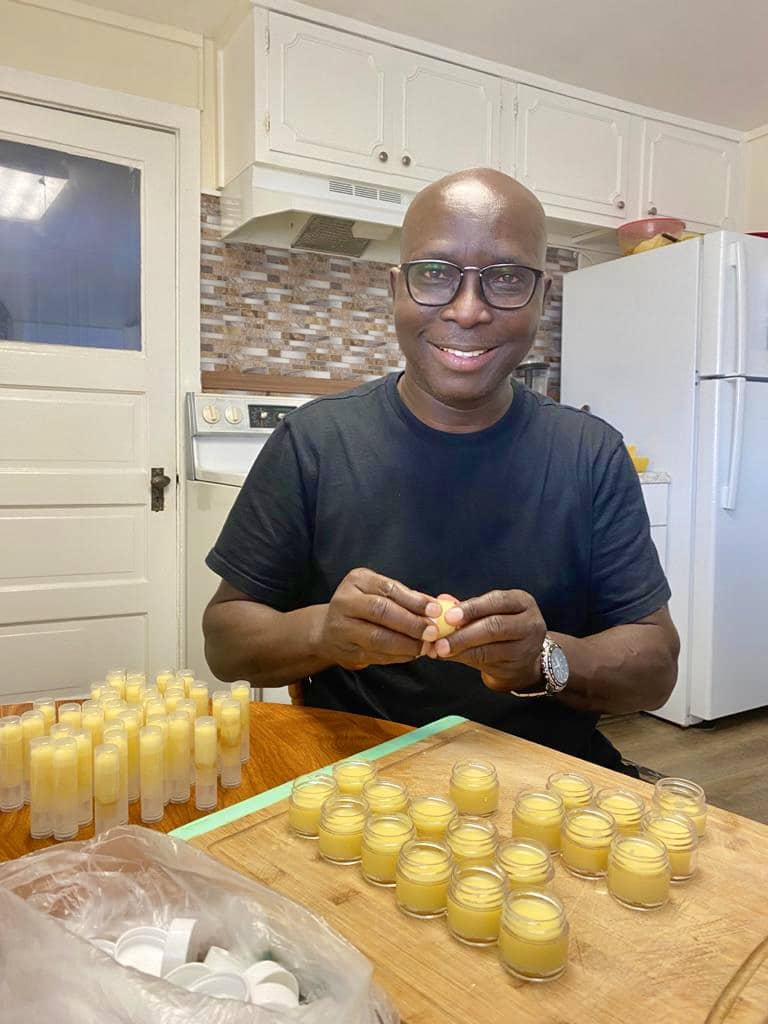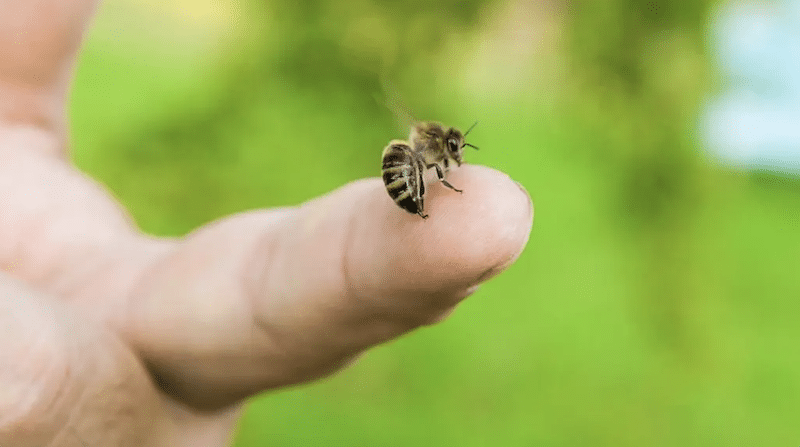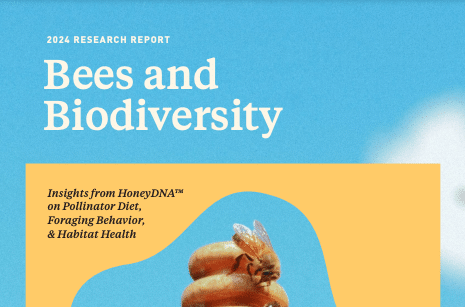Meet Daniel, a Best Bees beekeeper in Salt Lake City! He’s been with Best Bees for 4 years but began his beekeeping career 27 years ago in Africa. He is an educator, published author, and founder of Bee-Craft Consult, and his most recent endeavor is launching a non-profit called FOB Foundation that aims to educate people about the impact of beekeeping. Get to know his story below.
What’s your name?
Daniel Oduntan
What city do you live in?
I live in Salt Lake City, Utah state.
What is your title at Best Bees?
Beekeeper, Trainer, and Consult
So what first intrigued you about bees?
When you’re working with bees, you get to see how hard they’ve worked to make honey. That makes me so happy.
Everybody wants their bees to be doing well, so when you see a colony not doing fine, you feel bad. So what excites me about beekeeping is when I see the colony strong and doing well.
What was your first experience with bees?
My first encounter with bees was after a beekeeping workshop as a final year student at the University of Agriculture in Nigeria in 1993.
After the workshop, I just had the feeling to start out right away, so I contacted a brother, not a biological brother, who happened to be a senior of my Alma mater in high school (Baptist Boys’ High School, Abeokuta). I asked him for financial help and he gave me some money to start beekeeping.
How is honey in Africa different to the honey in the United States?
In Africa, we have what we call palm wine, which is a natural drink from trees and that’s the area I located my hives. So, being a sugary substance, the bees always take from that area. The honey that we’re used to in Africa is very dark, but these bees began to create honey that was white!
I was surprised, so I asked the local honey sellers in Africa, what could have happened. They told me to go home and boil it. When I boiled this white honey over a fire, it began to foam–the longer I did this, the more the honey became darker.
When you tell people you’re a beekeeper, what are their first reactions to that?
They see you as Superman. “You keep bees?!”
In Africa, the idea of beekeeping is strange, because what we understand about bees in Africa is that African bees can kill you. There is a belief that people can use spiritual power to attack fellow human beings by bees.
When I tell people in Africa that I keep bees, people say “Don’t go, it can kill you!”. But with my passion and interest, I never listened.
So you don’t have any fear of bees?
I am afraid of bees as any other person, but one thing I know is that when I’m working with bees, there is a way to carry myself, and more importantly I know how to use the smoker, I won’t make the bees angry.
While I am afraid of bees, I am not afraid of stings while I am working with them. They don’t sting me because I know what to do to keep them at bay.
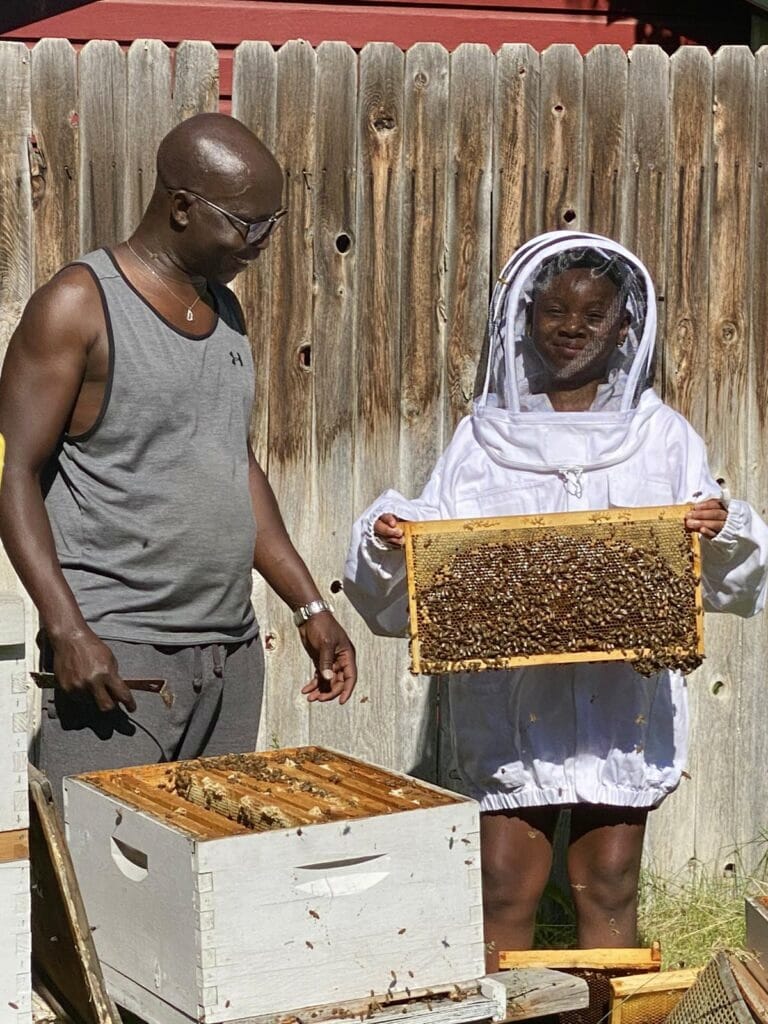
What would you say is your favorite part about beekeeping?
I love beekeeping because the more I read, the more I seek to know. What really interests me about beekeeping is when I’m teaching people about it. When I was planning to have a school, a training vocational center, I made up my mind that I need to know more than people I want to teach, so I take time to really know how to handle bees. That way, when I’m teaching other people, they’re able to know it and understand it as I do.
It makes me feel good that I’ve impacted someone, so I like to show people the nitty-gritty of what I do, and that’s why my major area of work within beekeeping is education.
The more people know about bees, the more they want to come closer. But if you don’t have the right people to share this information about beekeeping or honey, they will never know the benefits.
In terms of educating others about beekeeping, we know you started Bee-Craft Consult, but you’ve also launched a non-profit. Could you tell us a little bit about FOB Foundation?
I’m so passionate about training, and I believe that giving out information is how you can empower people. I want to live a legacy, and I want people that will live after me to say that I amazed them.
In order to do that, you need to be a blessing to people and allow them to benefit from you. That’s when they can remember you, and I can only do that with what I know, which is beekeeping.
We have already launched the foundation in Nigeria, and now we are working on it in America. The name of the foundation is FOB Foundation, which I named after my late mom, Madam Felicia Oduntan Bee-Craft Foundation (FOB FOUNDATION). With the foundation, we want to help people here in the United States learn more about beekeeping, and we do this with our project called Adopt a Colony.
As a host, you can tell us to bring a colony to your house. You give us a space with a good environment, we come there to manage it, and we train you if you show interest in the practice of beekeeping. The foundation gives people free training and shows them what they need to know, and from there they can start their own beekeeping practice.
We also ask for support and donation, and I’m happy to say that we have a donation from Best Bees! They’re giving us a complete 2 sets of beehives with bee suits and some other necessities for beekeeping. There is also an organization in Salt Lake, called Slow Food Utah and they donated $1,500 for the foundation to build the hives, buy packages of bees, and do what we can to help people.
We want to grow the foundation not only in America but in any part of the world, even as far as going back to Africa, because in Africa, there is so much opportunity but the people need someone to teach them.
How can the people who are reading this blog support your foundation?
We are working on a website for the foundation, but right now, there is a landing page on Bee Craft’s website that people can donate to support the foundation. As a young, growing foundation, we need people and anybody can support us, and it’s not all about the money. If you know people who can help out with the foundation or with the website, or if they want to donate equipment, they’re welcome and we would appreciate it.
So what are you up to when you’re not beekeeping or when you’re not educating people?
I don’t do anything else besides beekeeping! I don’t even have a hobby, and the only thing I like to do is sit down and think about how I can be more useful to other people with the skills I have. I love that.
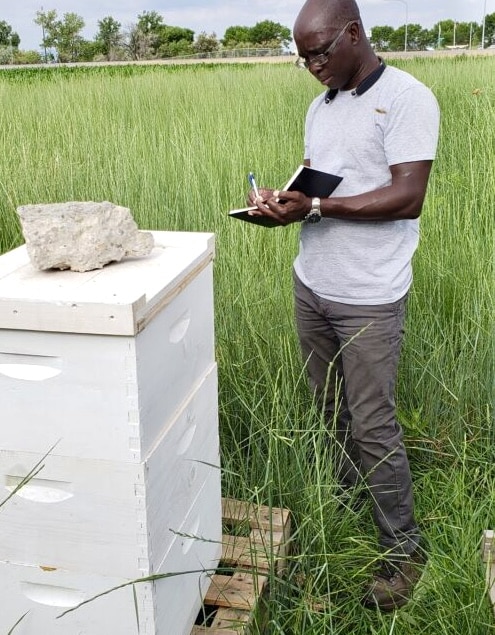
What is next for you in terms of the foundation and your work with Best Bees? What are you hoping to accomplish in the next year?
I want to give thanks to Best Bees because I’ve been working with them since 2019 and I have benefited from so much of their information. There’s a lot of stuff that I never knew when it comes to beehive management and data collection information.
Right now, my mind is saying to go back to Africa. There is so much that is within their reach, but they don’t know how to utilize that information and need someone to teach them.
We need to go and teach them and show them how they can become beekeepers, too. From April, August, September to November is the busiest time [for beekeeping] in America. But they’re not busy in Africa. That’s not the busiest time for beekeeping, it’s actually flipped.
So my plan is to go to Africa from one country to another and try to educate people about beekeeping and give them the tools and resources they need to do it themselves.
Where can people find and support you on social media?
You can find me on Facebook for Bee Craft Consult, and you can get my information there. I post a lot of videos showing people how beekeeping is done. You can also find me on Instagram at @beecraftconsult.


